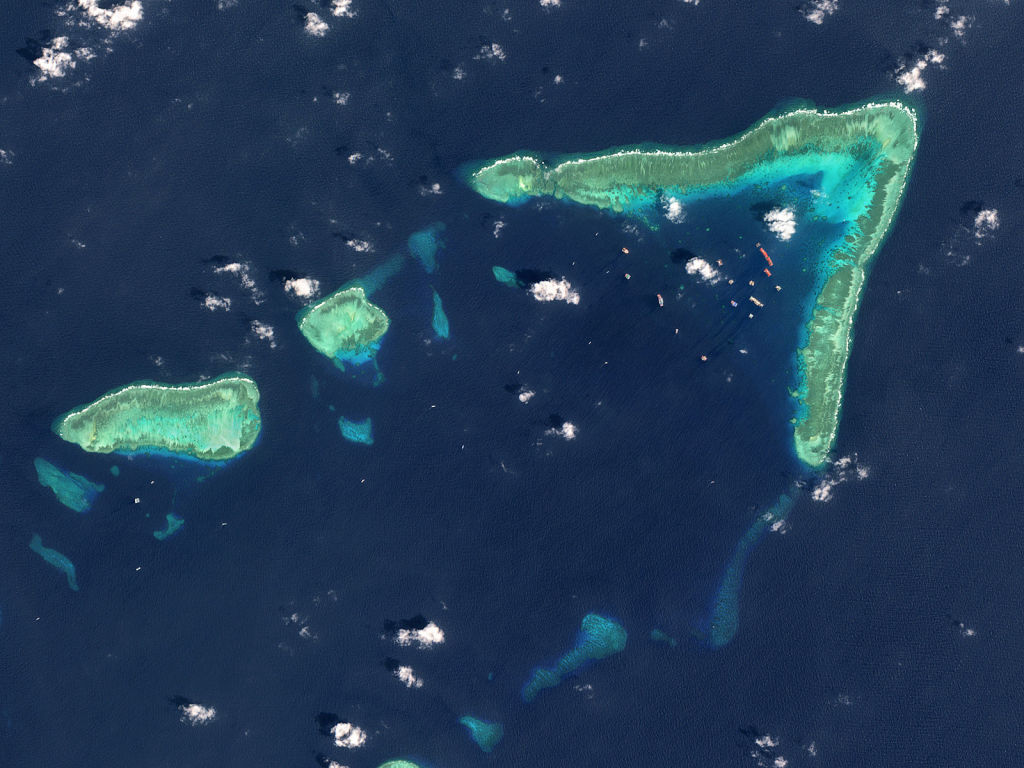Happy Friday! We’d like to wish all of our Jewish readers a very happy Hanukkah! We hope the Festival of Lights brings you peace and hope in the face of the world’s darkness.
Quick Hits: Today’s Top Stories
- The son of Gadi Eisenkot—a minister in Israel’s emergency war cabinet and the former Israeli Defense Forces (IDF) chief of staff—was among the five Israeli soldiers killed in the last several days of fighting in Gaza, the IDF said on Thursday, bringing the number of IDF deaths in the offensive to 89. Separately, the U.S. began imposing visa restrictions earlier this week on anyone—Israeli settlers or Palestinians—who has engaged in violence in the West Bank after several reported instances of violence against Palestinians by Israeli settlers. “The United States has consistently opposed actions that undermine stability in the West Bank, including attacks by Israeli settlers against Palestinians, and Palestinian attacks against Israelis,” Secretary of State Antony Blinken said Tuesday. “We have underscored to the Israeli government the need to do more to hold accountable extremist settlers who have committed violent attacks against Palestinians in the West Bank.”
- The Justice Department unsealed an indictment on Thursday against two Russian hackers who prosecutors allege were acting on behalf of the Russian government to breach the emails of individuals working for U.S., British, and other allied government agencies. “The conspirators used ‘spoofed’ email accounts designed to look like personal and work-related email accounts of the group’s targets,” prosecutors alleged, in order to gain access to their targets’ email accounts. The hackers reportedly intended to release sensitive information regarding high-profile British political figures to disrupt U.K. politics.
- The Biden administration on Thursday unveiled a framework for circumstances under which federal agencies could seize the patents of certain drugs developed with taxpayer-funded research under the auspices of the Bayh-Dole Act’s “march-in” authority, which could allow the federal government to license the patents to other companies in order to sell the drug for less under generic labels. For the first time, the price of prescription medicine is one of the factors that agencies may consider. The Biden administration will “make it clear that when drug companies won’t sell taxpayer-funded drugs at reasonable prices, we will be prepared to allow other companies to provide those drugs for less,” said Lael Brainard, White House national economic advisor. No federal agency has ever used the march-in authority, and the framework will now be open for public consideration for 60 days. “Let’s be clear, seizing patents is a confiscation of property,” said U.S. Chamber of Commerce executive vice president Neil Bradley. “If patents for medicine are seized today, what property will the government seize tomorrow? The Chamber will use every tool at our disposal to stop the administration from destroying America’s ability to discover the next breakthrough treatment or cure.”
- The U.S. military announced on Thursday it would conduct joint military exercises in Guyana amid increased speculation that Venezuelan President Nicolás Maduro might try to forcibly annex part of the neighboring nation’s territory. “In collaboration with the Guyana Defence Force, the U.S. Southern Command will conduct flight operations within Guyana on December 7,” the U.S. Embassy in Guyana reported in a statement yesterday. “The U.S. will continue its commitment as Guyana’s trusted security partner and promoting regional cooperation and interoperability.” Earlier this week, Maduro ordered state-owned companies to “immediately” begin exploiting oil and other natural resources in Guyana’s Esequiba region after a weekend referendum passed in Venezuela claiming sovereignty over the enclave. The U.N. Security Council will meet later today to discuss the territorial dispute between Guyana and Venezuela.
- Hunter Biden was indicted on nine tax charges on Thursday, including three felony counts and six misdemeanor charges alleging President Joe Biden’s son understated his income, overstated expenses, and ultimately failed to pay at least $1.4 million in owed taxes between 2016 and 2019. The new charges—from a federal grand jury in California—carry a maximum prison sentence of up to 17 years, and come as House Republicans consider impeachment charges against the senior Biden for his potential involvement in his son’s business dealings. Special counsel David Weiss—long tasked with overseeing the federal investigation into the president’s son—has also brought gun-related charges against Hunter in Delaware.
- A Texas judge ruled Thursday that a woman who is 20 weeks pregnant may obtain an emergency abortion despite a law banning most abortions in the state. Travis County District Judge Maya Guerra Gamble, an elected Democrat, granted a temporary restraining order to Katie Cox, who is pregnant with a child diagnosed with Trisomy 18, allowing her to seek an abortion under the state’s limited exceptions. “After multiple screenings, ultrasounds, and diagnostic testing, Ms. Cox’s physicians have confirmed that her baby may not survive to birth and, if so, will only live for minutes, hours, or days,” Gamble wrote in her ruling. “The longer Ms. Cox stays pregnant, the greater the risks to her life.” Texas Attorney General Ken Paxton, a Republican, sent a letter to three Houston-area hospitals saying, despite the ruling, they could be held civilly or criminally liable for violating abortion laws.
- CNN announced Thursday it will host two Republican primary debates next month, in Iowa and New Hampshire. Each debate will take place just days before the first two primary contests—on January 10 at Drake University in Des Moines, Iowa, and on January 21 at St. Anselm College in Goffstown, New Hampshire. To qualify for the Iowa debate, candidates must register at least 10 percent in three national or Iowa-specific polls that meet CNN’s standards. To qualify for the New Hampshire debate, candidates must meet the 10 percent polling requirement in three national or New Hampshire-specific polls, or place in the top three in the Iowa caucuses. The CNN debates are not yet officially approved by the Republican National Committee, but Florida Gov. Ron DeSantis has already signaled he will participate. ABC News also announced on Thursday it would also host a GOP primary debate in New Hampshire, just days before the CNN event.
More Maritime Troubles

In any relationship, it’s important to take things at the right pace, making sure both parties are on the same page and share the same priorities. But sometimes you just go head over heels. Something like that has happened between the U.S. and the Philippines over the last 18 months: With last summer’s election of a new president much more favorable to America than his predecessor, the Philippines has drawn closer to the U.S., and the Biden administration has tried to take advantage of the renewed attraction—much to the chagrin of Chinese President Xi Jinping.
China has grown increasingly bold in the South China Sea, and its incursion into disputed Philippine maritime territory earlier this week is just the latest in a string of aggressive incidents. On Sunday, the Philippine Coast Guard (PCG) accused China of swarming the Whitsun Reef, which is part of the Spratly Islands—disputed territory claimed by the Philippines, China, Vietnam, and Malaysia, and partially occupied by each country. (Brunei maintains a partial claim but does not occupy any territory.) The Whitsun Reef lies 175 nautical miles off the coast of Palawan, a large island in the Western Philippines, and within the country’s exclusive economic zone (EEZ).
A PCG spokesperson shared footage of Chinese maritime militia vessels in the region earlier this week, saying 111 ships initially swarmed the area on November 13—and that that number has since grown. Dozens of the vessels appeared to be secured together, forming a long raft of ships. “It is reasonable and lawful for Chinese fishing boats to operate and take shelter in the waters,” said Chinese Foreign Ministry spokesperson Wang Wenbin. China’s maritime militia is purportedly a fishing force, but often acts in concert with the Chinese military and law enforcement to exploit the gray area between outright conflict and peace in the South China Sea. China conducted a similar swarm of the reef in March 2021.
China maintains a claim to nearly all of the territory within the South China Sea. In 2016, an international arbitral tribunal roundly rejected the legal basis of China’s claims. But that hasn’t stopped China from expanding its footprint and military presence in the region, including by building artificial islands complete with airstrips and military infrastructure. China has added more than 3,200 acres of land to the seven outposts it occupies in the Spratly Islands since 2018, according to the Defense Department.
The harassment of Philippine vessels has gone up in recent months, with China deploying its militia and coast guard from their outposts to outnumber and intimidate ships operating in the region. The Second Thomas Shoal is another disputed area within the Philippine EEZ, where the Philippines maintain an outpost on an intentionally grounded ship. The Chinese have tried to block Philippine vessels from resupplying the outpost, sailing directly in front of the ships, firing water cannons and military-grade lasers at them and, in October, colliding multiple times with ships in a Philippine convoy. China has also deployed ships off the coast of Thitu Island—a Philippine-occupied Spratly Island—preventing residents from accessing fishing areas further from shore.
As China’s aggression has increased, the U.S. has bolstered its maritime support of the Philippines. The USS Gabrielle Giffords, a U.S. naval warship, patrolled near the Second Thomas Shoal on Monday, sparking an outcry from China. The maneuver follows last month’s U.S.-Philippine joint patrols. “This significant initiative is a testament to our commitment to bolster the interoperability of our military forces,” said Philippine President Bongbong Marcos. U.S. allies in the region—namely Japan and Australia—began air and sea exercises with the Philippines last month in a further show of support for the country, whose own naval might is vastly outmatched by China’s.
Such close military cooperation reflects the whirlwind diplomatic romance between the U.S. and its one-time colony. U.S.-Philippines relations deteriorated significantly under Marcos’ predecessor, former President Rodrigo Duterte, as Duterte distanced the country from Washington and tried to make an ally out of China. He publicly declared a military and economic separation with America in 2016, although little changed in pacts and agreements between the countries. Duterte also ended in 2020 the Visiting Forces Agreement that allowed U.S. troops to rotate through the Philippines for training and exercises, only to abruptly reverse course the next year.
When Marcos was elected in May 2022, he pivoted away from Beijing and back toward a closer relationship with the U.S. Just last month, he announced the Philippines would leave China’s Belt and Road initiative. The Biden administration also wasted no time in a charm offensive that one analyst described as “unprecedented love-bombing.” President Joe Biden was the first world leader to call Marcos congratulating him on his victory, and Marcos has already visited the U.S. multiple times, including a D.C. state visit in May and a trip last month to the U.S. Indo-Pacific Command at Camp H.M. Smith in Hawaii. A joint statement from Biden and Marcos during the May visit reaffirmed the mutual defense commitments between the two countries as “ironclad.”
The Biden administration responded to Marcos’ U.S. visits in kind, dispatching Secretary of State Antony Blinken and Defense Secretary Lloyd Austin to the Philippines, as well as Vice President Kamala Harris. Harris has met with Marcos five times, including last month on the sidelines of the Asia-Pacific Economic Cooperation Forum in San Francisco. “I do not see a future for the Philippines that does not include the United States,” Marcos said during his first meeting with Harris held in Manila last November. “I cannot think of an area where we have not cooperated, collaborated, and have had good results for both our countries.”
The U.S. has backed up the diplomatic tête-à-têtes with action over the last year. “Every year, from Obama through Trump and now Biden, we’ve increased military aid,” Harry Thomas, the U.S. ambassador to the Philippines during the Obama administration, told TMD. In April, the U.S. committed to providing the island nation with a range of military equipment, including “military transport aircraft and coastal- and air-defense systems,” over the next five to ten years. The Philippines also expanded the number of its military bases—from five to nine—at which U.S. forces are allowed to build facilities and operate. “These efforts are especially important as the People’s Republic of China continues to advance its illegitimate claims,” Defense Secretary Austin said when the agreement was announced in February. The quiet part of the new expansion is that it would likely provide a bigger staging ground for a U.S. response to a conflict over Taiwan, as the northern Philippines are less than 200 miles away from the southern Taiwanese coast.
But some analysts argue the U.S. needs to also increase economic cooperation and trade with the Philippines to help cement the diplomatic and security gains of the last year. “We cannot just show the Filipinos … that we’re trying to be hegemons and only interested in military [cooperation],” Thomas told TMD. “We have to show and prove that we are interested in helping them improve their economies.” He believes greater economic investment is a longer-term project that “resonates with the Filipino people,” and pursuing projects with popular buy-in is key to preventing backsliding in the U.S.-Philippines relationship under future presidents.
The Biden administration took at least one concrete step in that direction last month, signing an agreement with the Philippines to export nuclear technology to help the country build out civilian nuclear energy infrastructure. “Nuclear energy is one area where we can show the Philippines-U.S. alliance and partnership truly works,” Marcos said.
But as the U.S. draws closer to the Philippines, Chinese aggression is likely only to increase in the South China Sea, raising the risk of naval incidents spiraling into a conflict. China has already conducted more than a dozen “coercive and risky” maneuvers targeting U.S. forces in the region since 2022. Biden and Xi’s meeting last month led to an agreement to resume military-to-military talks—a breakthrough that would ideally reduce the chances of escalation—but as of now, such talks have not resumed.
Worth Your Time
- Last night, Jews around the world gathered to celebrate the first night of Hanukkah. But with antisemitism on the rise, some families may have decided on a scaled-back celebration. “Last month, actor Adam Kulbersh told his 6-year-old son Jack they would not be putting out Hanukkah lights this year due to safety concerns,” Matt Lebovic wrote for the Times of Israel. “Kulbersh shared the conversation with his friend Jennifer Marshall, who immediately said that despite not being Jewish herself, she would display a menorah in her own window to support him and Jack. Project Menorah was born out of that ‘act of compassion,’ said Kulbersh, whose initiative accrued thousands of followers on Instagram and Facebook, and resonates with some American Jews fearful of ‘publicizing the miracle of Hanukkah.’ The Project Menorah website offers downloadable menorahs for people to print and put in their windows. There is also information about the appalling state of antisemitism in the U.S. since October 7, when thousands of Hamas-led terrorists infiltrated Israel, brutally murdered 1,200 people and took 240 hostages. ‘If this many people are willing to put out a menorah on your block in support of Jewish people, then maybe you as a Jew don’t need to be afraid to put out your own menorah,’ said Kulbersh, adding he and his son are now going ‘all-in’ for Hanukkah, instead of keeping last year’s decorations in the closet.”
Presented Without Comment
NBC News: U.S. Celebrities Were Tricked Into Recording Videos Later Doctored Into Anti-Zelensky Propaganda
Toeing the Company Line
- Alex fact checked various claims made during the fourth Republican presidential primary debate.
- In the newsletters: Mike and Sarah looked into how far presidential immunity can go and Nick wondered (🔒) whether Republican voters really are cool with authoritarianism or really just want a Trump redux.
- On the podcasts: Jonah and Sarah aired their grammar grievances on The Skiff (🔒), and on The Dispatch Podcast, they—plus Steve—ranked the winners and losers of Wednesday’s GOP primary debate and vented about the embarrassing failure of the elite university presidents to denounce calls for genocide against the Jews.
- On the site: Tom Shaffner explains the status of the U.S. housing market.
Let Us Know
As a reminder, we’re moving to a new merch vendor, which not only means there will be a lot more Dispatch swag options, but that everything currently available in our store is 15 percent off. Just add a product to your cart—shirts, hats, mugs, Yeti tumblers—and the discount will automatically be applied.
As we’re thinking through additional products, what Dispatch-themed merch would you like to see?








Please note that we at The Dispatch hold ourselves, our work, and our commenters to a higher standard than other places on the internet. We welcome comments that foster genuine debate or discussion—including comments critical of us or our work—but responses that include ad hominem attacks on fellow Dispatch members or are intended to stoke fear and anger may be moderated.
With your membership, you only have the ability to comment on The Morning Dispatch articles. Consider upgrading to join the conversation everywhere.